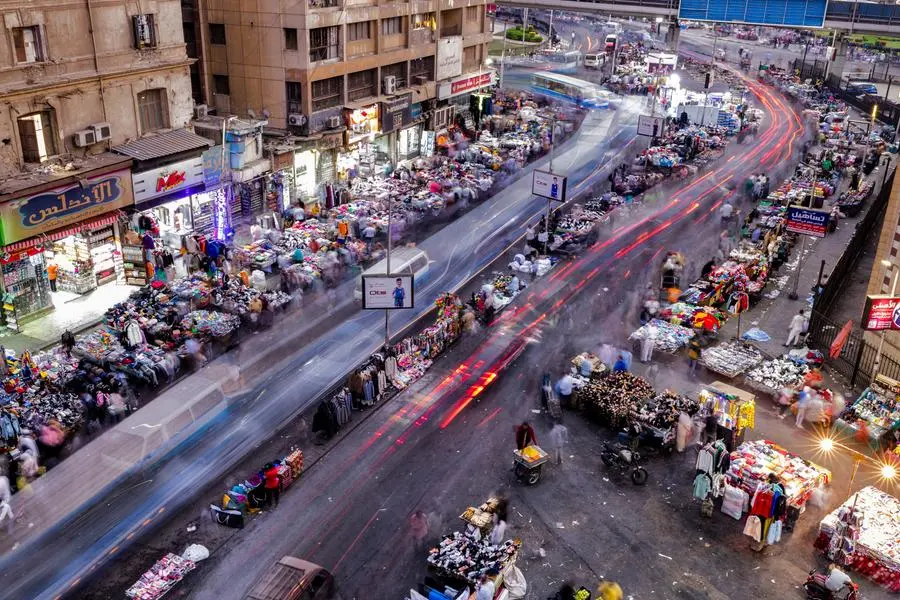PHOTO
In recent years, Egypt has been adopting a number of economic reforms that should have been affecting the life standards of its citizens. However, the country’s population has been growing rapidly, reaching 105.5 million people according to the Central Agency for Public Mobilization and Statistics’ (CAPMAS) Population Clock on September 24th. Egypt's population growth rate has had a significant impact on its economy, and addressing this challenge will require a multi-faceted approach.
Economic Impact of Growing Population
Egypt's population grew by around 1.55% at the beginning of 2023, reaching 104.5 million people, compared to 102.9 million citizens at the beginning of 2022, which is around 1.8% higher than the 101.5 persons living in Egypt at the beginning of 2021, according to the CAPMAS’ Egypt in Figures in March Issue.
On January 1st, 2023, individuals from the ages of 15 to 64 who are able, willing, and looking for work represented 61.7% of the country's total population, while citizens older than 64 made up 3.9% of the population, and youngsters who are below 14 years old accounted for 34.2% of the population, as per CAPMAS’ figures.
Aya Zoheir, Research Section Head at Zilla Capital, tells Arab Finance: "A rapidly growing population, particularly if driven by a high youth population like Egypt, can exert pressure on the labor market. This means that every year, a significant number of new job seekers enter the labor market. If the economy does not grow fast enough to absorb this new labor force, it can lead to an increase in unemployment rates.”
Egypt's problem with population growth does not only prey on the fruits of growth but also eats away at agricultural lands and limited water sources. These lands, which constitute only 5% of the country's area, are located on both sides of the Nile River, which constitutes almost the only source of water.
“Rapid population growth can strain infrastructure, leading to challenges in transportation, housing, and utilities. Inefficient infrastructure can hinder business growth and, consequently, employment generation. And this is mainly why the government of Egypt has been very keen on focusing on infrastructure since 2014,” Zoheir says.
President Abdel Fattah El-Sisi warned of the dangers caused by population growth in Egypt, the African continent, and the world. "Population growth is one of the most serious issues facing Egypt,” El-Sisi stated during the Global Congress on Population, Health, and Development, held in early September 2023. The population of Africa will reach about 1.6 billion people within a few years. Despite the continent's large resources, they will be insufficient in the future, El Sisi explained.
The increasing population impacts the country’s resources compared to citizens demands. "The most difficult thing I go through is knowing that the resources available are far less than what is actually needed, and that this will be reflected badly on the quality of everything," El-Sisi said.
Meanwhile, in a poll conducted by Arab Finance, 66% of participants said that the growing population highly affects poverty rate in Egypt.
Curbing Population Growth Rate to Drive Economic Growth
Egypt has been working on decreasing its population growth rates in recent years. Accordingly, the number of births fell to 2.183 million in 2022 from 2.7 million in 2014, while the fertility rate dropped from 3.5 children per woman in 2014, compared to 2.85 children per woman in 2021, as revealed by Minister of Health and Population Khaled Abdel Ghaffar earlier in September.
This comes as the United Nations Population Fund (UNFPA) participates with the Egyptian government in implementing the goals of the National Project for Egyptian Family Development through several axes, including the axis of family economic empowerment and the cultural, awareness-boosting, and educational axes to achieve the goals of sustainable development and Egypt Vision 2030.
“On the positive side, a large and young population can be a demographic dividend if managed properly. It can drive innovation and entrepreneurship, and provide a competitive labor force. It is essential for policymakers to ensure adequate skills development, encourage entrepreneurial ventures, and provide a conducive environment for businesses to flourish,” Zoheir explains. This comes as the high population can attract investors thanks to the larger consumer base it provides and the potential labor force.
Accordingly, the country can utilize its youth to support economic growth. Zoheir says that “leveraging growing human capital to boost the economy requires multiple strategies that focus on both short-term and long-term goals. When a country has significant and growing human capital, it possesses potential dynamism that, if used properly, can lead to substantial economic growth." Therefore, the high population can be beneficial as the country enhances the quality of education, provides vocational training and continuous learning, and ensures curricula that support youth with the skills needed in the market.
Although a growing population rate is a challenge that may hinder economic growth, the country can work on several levels to address this challenge. Whether to use the full potential of its capital or work on decreasing the birth rate, Egypt is working on these paths to face the economic challenges caused by high population growth.
Copyright © 2022 Arab Finance Brokerage Company All rights reserved. Provided by SyndiGate Media Inc. (Syndigate.info).





















